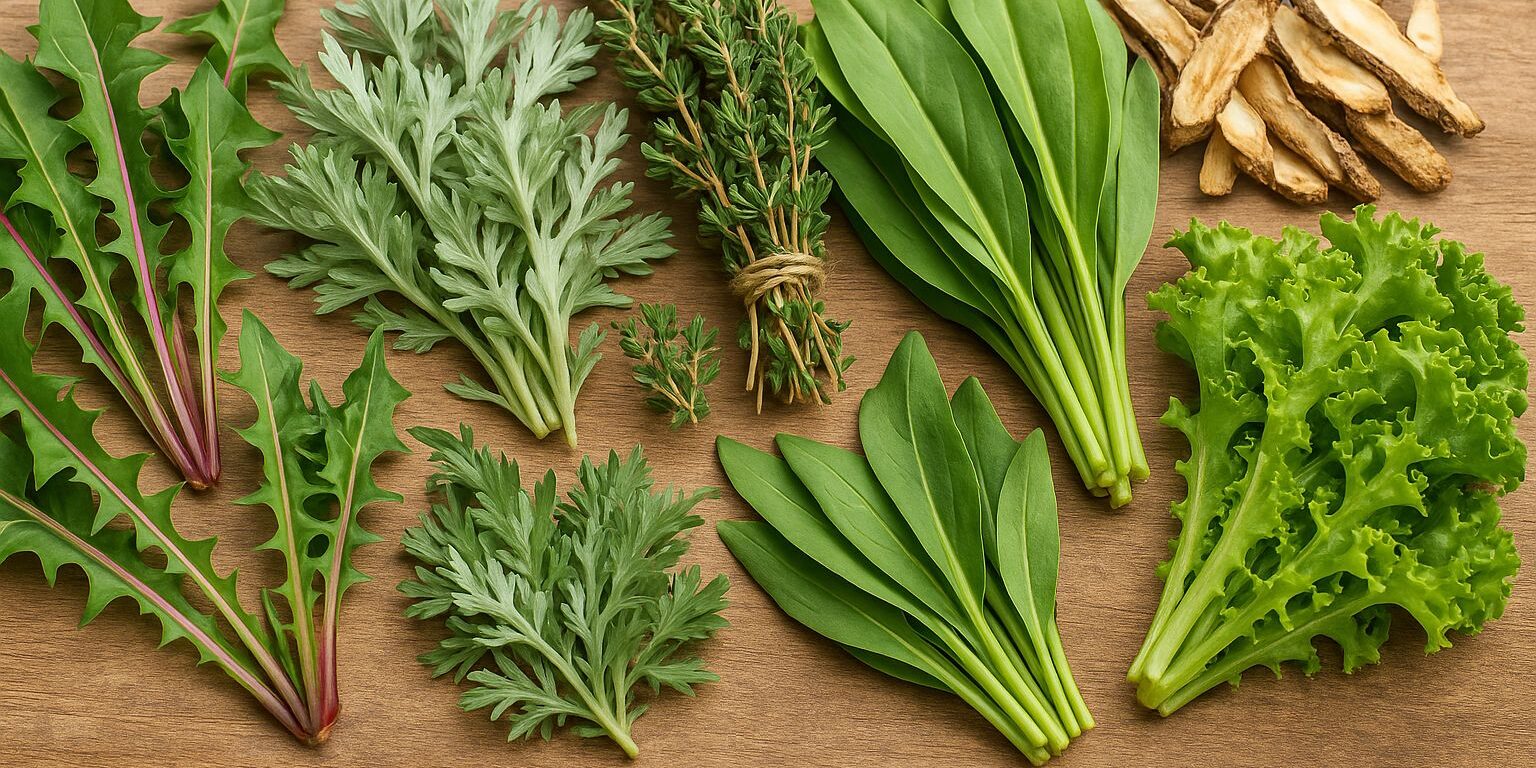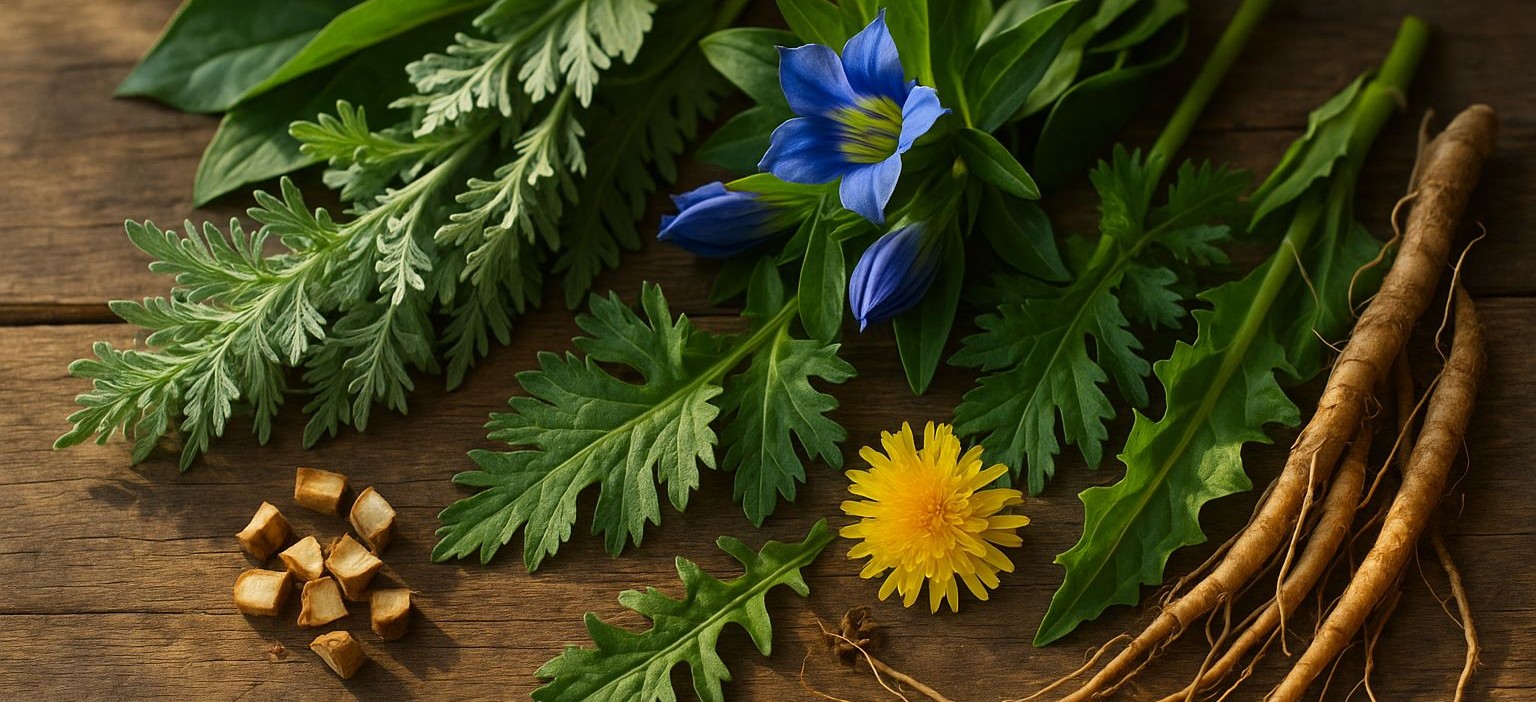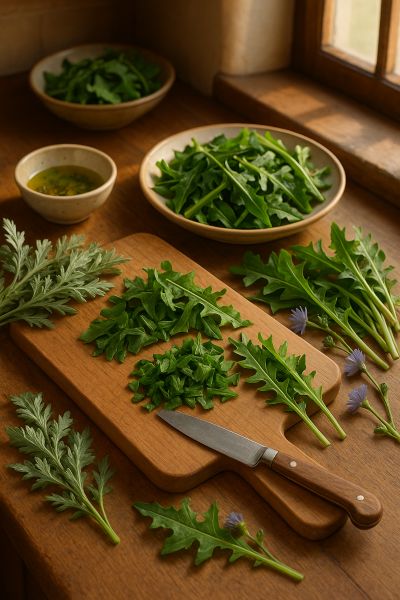
The Timeless Benefits Of Bitter Herbs – Ultimate Guide!
Just as your ancestors have relied on bitter herbs for their health benefits, this guide will explore how you can harness their power in modern times. From promoting digestive health to enhancing liver function, these herbs offer an array of nutritional benefits that are often overlooked. Discover the ancient wisdom behind these natural remedies and learn how to incorporate them into your daily routine for a healthier lifestyle. Let this ultimate guide illuminate the path to better health through the magic of bitter herbs.
Key Takeaways:
- Bitter herbs play a significant role in promoting digestive health by stimulating the production of digestive enzymes and bile.
- These herbs are known for their detoxifying properties, helping to cleanse the liver and improve overall metabolic function.
- Regular consumption of bitter herbs can support immune function due to their high antioxidant content and anti-inflammatory effects.
- Many bitter herbs have been linked to mood enhancement and improved mental clarity, making them beneficial for cognitive health.
- Incorporating bitter herbs into your diet may aid in weight management by regulating appetite and improving fat metabolism.
The Science of Bitterness: Why Bitter Herbs Matter
Bitter herbs offer a fascinating perspective into the world of flavor and health, emphasizing the significance of taste in our well-being. These plants, often overlooked due to their strong flavor, harbor vital compounds that stimulate digestive and metabolic functions. Your body’s response to bitterness triggers a cascade of reactions, enhancing nutrient absorption and promoting detoxification mechanisms. As you explore the diverse array of bitter herbs available, you’ll uncover the profound ways bitterness can influence your overall health and vitality.
The Biochemical Basis: How Bitterness Works in the Body
The sensation of bitterness engages specific receptors on your taste buds, specifically T2R receptors, which are instrumental in detecting bitter compounds. This process prompts the release of digestive juices and enzymes, facilitating effective digestion. Additionally, bitter compounds can enhance bile production, crucial for fat metabolism, which underscores their role in promoting improved digestion and nutrient absorption.
The Role of Taste in Health: Implications Beyond Flavor
Your taste perception extends far beyond mere enjoyment, impacting both your physiological and psychological health. Research indicates that a diet rich in bitter foods can bolster gut health by promoting a diverse microbiome. Furthermore, activating bitter receptors may play a part in curbing sugar cravings, supporting weight management and reducing the risk of metabolic disorders like Type 2 diabetes. Understanding these connections can motivate you to embrace more bitter flavors in your meals.
Related: Gut Health Cheat Sheet
This engagement of taste receptors is not just about pleasure; it’s an intricate dialogue between your body and the food you consume. For instance, studies have shown that individuals who regularly incorporate bitter herbs report a heightened sense of fullness after meals, which can lead to healthier eating habits. You might even notice that adding bitter herbs to your diet helps reduce the inclination to reach for overly sweet snacks, promoting better choices and a more balanced diet. Exploring the depth of flavors available in bitter herbs can thus contribute to a more mindful and health-conscious lifestyle.
A Potent Legacy: Historical Uses of Bitter Herbs
 Bitter herbs have adorned the medicinal landscape for centuries, with their usage deeply embedded in various cultures.
Bitter herbs have adorned the medicinal landscape for centuries, with their usage deeply embedded in various cultures.
From ancient Egypt to traditional Chinese medicine, these plants were revered for their ability to support digestion, detoxification, and overall well-being.
Treatments using bitter herbs were often key components of healing regimens, passed down through generations as potent remedies to combat ailments and promote vitality.
Ancient Healing Practices: A Glimpse Through Time
The ancient Egyptians utilized wormwood for its digestive benefits, believing it helped with both stomach health and numerous ailments.Similarly, in ancient Greece, bitters like chicory and dandelion were mainstays in their pharmacopoeias, often used to prepare herbal wines that enhanced appetite and aided liver function. These practices highlight how societies have long turned to nature for foundational health solutions.
Cultural Significance: Bitter Herbs in Traditional Medicine
Across cultures, bitter herbs hold significant roles in traditional medicine. Indigenous tribes in North America used goldenseal and gentian for their cleansing properties, often integrating them into spiritual healing practices. In Ayurveda, bitter herbs such as Neem are revered for purifying blood and balancing the body. This illustrates a universal understanding of the healing power of bitterness and its place in holistic health approaches.
Bitter herbs symbolize a link between cultural identity and health practices, providing insights into various traditions around the world. In Africa, the leaves of the bitter leaf plant are famously used in local cuisines and as medicine for ailments like malaria. Mediterranean cultures incorporate arugula for its digestive benefits, signaling an appreciation for bitter flavors that enhance not just culinary dishes but overall health. By understanding these historical and cultural dimensions, you gain a greater appreciation for the wisdom that bitter herbs offer, inviting you to incorporate their remarkable benefits into your own wellness journey.
Health Benefits You Need to Know: Beyond the Bitter Face
 Bitter herbs pack a punch when it comes to health benefits, extending well beyond their distinct flavor. These potent plants can boost your overall wellness in various ways, providing a rich array of vitamins, minerals, and other phytochemicals that support vital bodily functions. As a result, integrating bitter herbs into your diet may lead to enhanced digestive health, improved detoxification processes, and stronger immunity, among other health advantages. By embracing their benefits, you can begin on a journey toward better health and vitality.
Bitter herbs pack a punch when it comes to health benefits, extending well beyond their distinct flavor. These potent plants can boost your overall wellness in various ways, providing a rich array of vitamins, minerals, and other phytochemicals that support vital bodily functions. As a result, integrating bitter herbs into your diet may lead to enhanced digestive health, improved detoxification processes, and stronger immunity, among other health advantages. By embracing their benefits, you can begin on a journey toward better health and vitality.
Digestive Powerhouses: How They Enhance Gut Health
Bitter herbs stimulate the production of digestive juices, aiding in nutrient absorption and promoting a healthy gut. By increasing bile flow and enzyme activity, they help break down food more effectively. This not only enhances digestion but can also alleviate bloating, gas, and discomfort after meals. Including bitter foods in your diet encourages a more balanced microbiome, which is important for optimal gut health and overall well-being.
Detoxification Allies: The Role of Bitter Herbs in Cleansing
Bitter herbs serve as powerful detoxification allies, assisting your body in eliminating toxins and waste. They support liver function, which is crucial for detoxification. By enhancing bile production and promoting liver enzymes, bitter herbs ensure your body eliminates harmful substances efficiently. Herbal options like dandelion root, milk thistle, and burdock root not only help cleanse your system but also provide antioxidant support, bolstering your body’s natural defenses.
Related: Gut Health Morning Shots
Incorporating bitter herbs into your daily routine can significantly impact your body’s detoxification processes. For instance, dandelion root has been found to aid liver detoxification, helping flush out harmful substances while providing important nutrients. Milk thistle protects liver cells from damage and supports their regeneration, making it an ideal choice for long-term liver health. Burdock root boosts the elimination of waste through urine, enhancing your kidney function and facilitating a thorough body cleanse. By understanding the specific benefits each herb offers, you can tailor your detox regimen for optimal results and vitality.
Culinary Exploration: Incorporating Bitter Herbs in Your Diet
 Integrating bitter herbs into your diet unlocks a realm of flavors.
Integrating bitter herbs into your diet unlocks a realm of flavors.
Not only that, but they even elevate your culinary creations while also boosting your health.
Start by experimenting with greens like arugula, dandelion, or endive in salads to introduce their unique sharpness.
Gradually incorporating these herbs into dressings or marinades can also enhance the overall taste profile of your dishes.
They are also offering not only complexity but also appealing health benefits.
Creative Recipes: Transforming Bitter into Delicious
Transforming bitter herbs into delightful dishes is all about enhancing their flavors. Try grilling radicchio with olive oil and a splash of balsamic vinegar for a sweet and smoky side dish, or blend fresh mint and parsley into your yogurt for a refreshing dip. Even a simple bitter greens pesto can bring a burst of unexpected flavor to your pasta and sandwiches, showcasing the versatility of these intriguing herbs.
Pairing Techniques: Balancing Flavors with Bitter Herbs
Balancing the bold flavor of bitter herbs requires an understanding of pairing techniques that soften their sharpness. Coupling these herbs with sweet elements like honey or fruit can create a delicious contrast, while creamy ingredients, such as cheese or avocado, can also help balance their intense taste. Adding acidity through citrus or vinegar brightens the dish, cutting through bitterness, and rounding out the flavors.
For example, combining arugula with juicy pear slices and a sprinkle of crumbled goat cheese creates a harmonious salad that marries bitter, sweet, and creamy notes beautifully. Similarly, when sautéing dandelion greens, adding a dollop of lemon-infused ricotta not only complements the bitterness but also enhances the overall texture and richness of the meal. Such thoughtful pairings can transform the experience of bitter herbs from daunting to delightful, showcasing their potential as crucial culinary components.
The Modern Perspective: Embracing Bitterness in Lifestyle Choices
Modern wellness movements are increasingly advocating for the inclusion of bitter herbs in your daily lifestyle. By embracing these flavors, you not only enhance your dishes but also unlock a plethora of health benefits. Incorporating bitters into your routine can act as a bridge between traditional remedies and contemporary wellness practices. As more people seek natural solutions for digestive issues and overall well-being, the popularity of bitter herbs is soaring, making them an important element of today’s health-conscious diets.
Bitters and Mental Wellness: The Connection to Mood
Your mental wellness is significantly impacted by what you consume, and studies suggest a fascinating link between bitters and mood regulation. Consuming bitter herbs can stimulate the production of digestive enzymes, leading to improved gut health, which in turn supports mental clarity and emotional balance. The bitters present in foods like dandelion greens or artichokes can enhance your body’s ability to process emotions, paving the way for a more balanced emotional state.
Rethinking Taste Preferences: Cultivating an Appreciation for Bitterness
Cultivating an appreciation for bitterness can transform your palate while offering numerous health benefits. By gradually incorporating bitter herbs into your diet, you can broaden your taste preferences and discover a whole new world of flavors. Start small with herbal teas or sprinkle bitter greens into your salads. Over time, your taste buds will adjust, allowing you to enjoy the complexities of bitters, increasing your overall enjoyment of food and enhancing your overall culinary experience.
Related: Forgotten Restorative Foods Grandma Used for Every Ailment
Exploring bitterness invites you into a unique culinary adventure, enabling you to discover delicate layers of flavors often overlooked in mainstream diets. Embracing bitter flavors can lead to nutritious meals that resonate with your health goals. For example, incorporating ingredients like bitter melon or arugula into your dishes not only enhances taste but also adds important nutrients. When you experiment with these ingredients, you’ll find that appreciating bitterness can elevate your cooking, making it a rewarding exploration of palate and health.
Summing up
As a reminder, incorporating bitter herbs into your diet can offer numerous health benefits, from improving digestion to enhancing overall wellness. By understanding their rich history and therapeutic properties, you can make informed choices that support your health journey. Whether you’re exploring herbal remedies or looking to elevate your culinary creations, embracing the timeless benefits of bitter herbs can contribute positively to your life. Take the knowledge you’ve gained and start integrating these powerful plants into your daily routine for optimal vitality.
FAQ
Q: What are bitter herbs and why are they important?
A: Bitter herbs are plants that possess a distinctly bitter flavor profile. They are often used in traditional medicine for their health benefits. These herbs are believed to stimulate digestion, enhance appetite, and support liver function. Their bitterness can increase the production of digestive enzymes and bile, which are important for breaking down food and absorbing nutrients effectively.
Q: What are some examples of common bitter herbs?
A: Some well-known bitter herbs include Dandelion, Wormwood, Gentian, and Orange Peel. Each of these herbs boasts unique benefits; for instance, Dandelion can help detoxify the liver, while Gentian is commonly employed to alleviate digestive issues. Incorporating these herbs into your diet, whether in teas, tinctures, or culinary dishes, can provide health-enhancing properties.
Q: How do bitter herbs benefit digestion?
A: Bitter herbs benefit digestion by stimulating the production of saliva and digestive juices in the stomach. Their bitterness signals the body to prepare for food intake, enhancing the digestive process. This stimulation can lead to improved nutrient absorption, reduce feelings of bloating, and alleviate symptoms of indigestion, making them a valuable addition for those struggling with digestive difficulties.
Q: Can bitter herbs be used for detoxification?
A: Yes, bitter herbs are often used in detoxification protocols due to their liver-supporting properties. Herbs like Dandelion and Burdock Root are known for promoting liver health, which plays a key role in the body’s detoxification processes. They may also help to eliminate toxins and waste from the body, leading to an overall feeling of wellness and vitality.
Q: How can I incorporate bitter herbs into my daily routine?
A: There are several ways to incorporate bitter herbs into your daily routine. You can brew them into teas, add them to smoothies, or use them as seasoning in cooking. Bitters are also available in tincture form, which can be added to water or taken directly. Starting with small amounts and gradually increasing the dosage can help you acclimate to their strong flavors while reaping their health benefits.
You May Also Like:
How to Recognize a Heart Attack and What to Do Next (Video)
Your Gut Called – It Wants Kombucha




